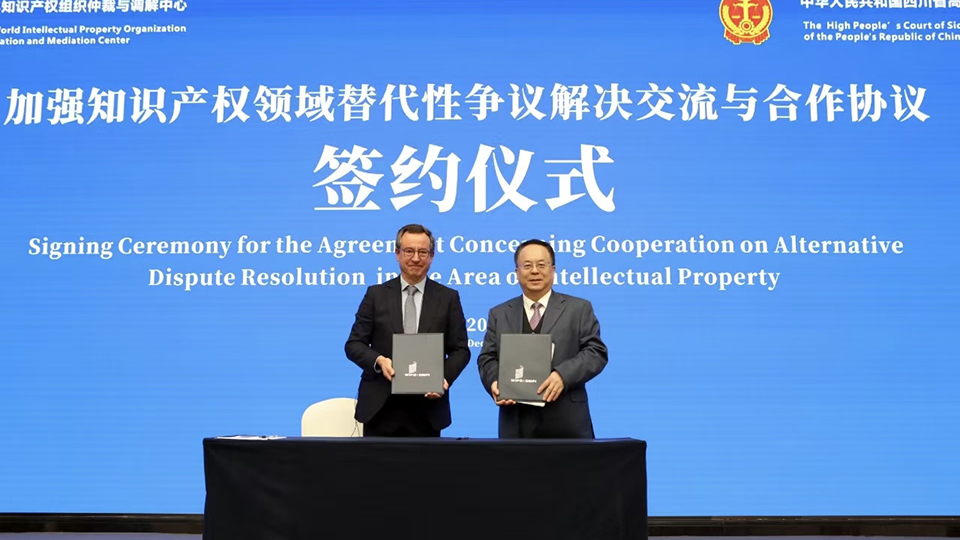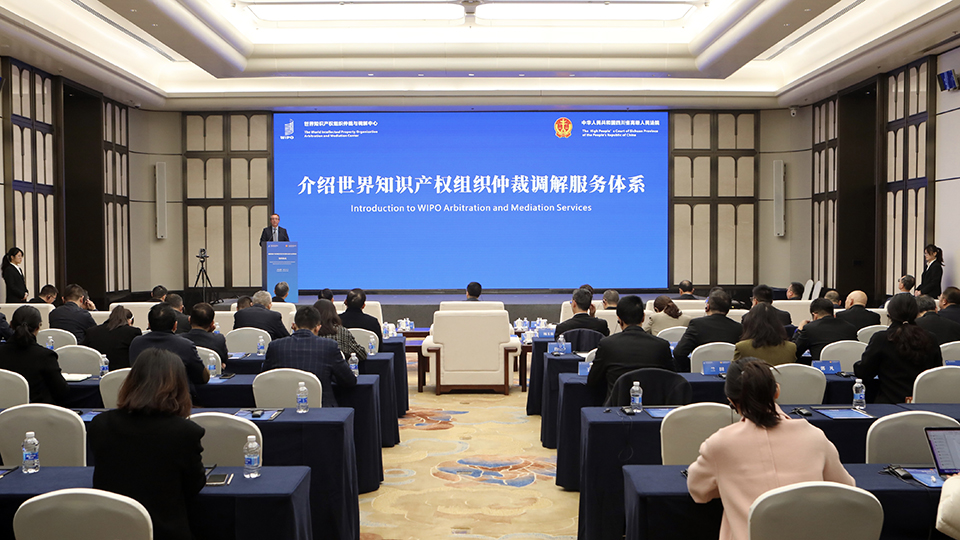WIPO China: WIPO Arbitration and Mediation Center Signed Cooperation Agreement with Sichuan High People’s Court
December 16, 2024
On December 3, the World Intellectual Property Organization (WIPO) Arbitration and Mediation Center and the Sichuan High People’s Court signed the Agreement Concerning Cooperation on Alternative Dispute Resolution in the Area of Intellectual Property. Ms. Wang Binying, Deputy Director General of WIPO, delivered a video speech at the Signing Ceremony.
Ms. Wang shared that WIPO leads the development of a balanced and effective global IP ecosystem. WIPO Member States adopted the WIPO Treaty on Intellectual Property, Genetic Resources and Associated Traditional Knowledge in May 2024 and the Riyadh Design Law Treaty in November 2024. With the two new treaties as a milestone success coming into force in not too far distant future, new momentum will be created to facilitate the growth and development of intellectual property (IP).
Ms. Wang said that WIPO has maintained a long-standing and close cooperative relationship with China and celebrated 50 years of cooperation in 2023. China has established itself as an innovation leader, raking 11th in WIPO’s Global Innovation Index (GII) 2024 and remaining the only middle-income economy inside the GII Top 15 for many years.
Ms. Wang noted that Sichuan, known as the “Land of Abundance,” has made remarkable achievements in innovation and IP development. Sichuan’s capital, Chengdu, ranked 23rd in the GII Science and Technology Clusters 2024, rising 33 places from its original place at 56th in 2018. Sichuan courts have fully leveraged the judicial functions in IP adjudication, enhancing the level of judicial protection for IP and effectively supporting innovation-driven development. WIPO, through the Technology and Innovation Support Centers (TISCs), IP Summer School as well as study visits on geographical indications (GIs), provides high-quality services for innovators and creators in Sichuan.
Ms. Wang expressed that, with the support of the Supreme People’s Court (SPC) of China, the WIPO Arbitration and Mediation Center and the Sichuan High People’s Court will collaborate in court-referred mediation of foreign-related IP cases, talent training, publicity and other areas. WIPO believes that this cooperation will facilitate the effective resolution of foreign-related IP disputes and foster the creation of a world-class business environment. WIPO looks forward to this cooperation achieving fruitful results in the future.
Ms. Tao Kaiyuan, Vice President of the SPC, delivered a video speech at the Signing Ceremony. Ms. Tao said the signing of the Cooperation Agreement will further promote the high-quality development of IP adjudication in Sichuan courts. She highlighted the need to uphold stringent IP protection, foster a market-oriented, rule-of-law and internationalized business environment, and strengthen China’s position as a preferred jurisdiction for international IP litigation. She also emphasized the importance of continued international cooperation to contribute China’s judicial insights to global IP governance.
Mr. Wang Shujiang, President of the Sichuan High People’s Court said that the signing of the Cooperation Agreement marks a new beginning. Sichuan courts, in collaboration with WIPO, aim to contribute to a more equitable global IP governance with objectives of greater efficiency and effectiveness and a spirit of openness and inclusivity.
About the Signing Ceremony
Mr. Ignacio de Castro, Director of the WIPO Arbitration and Mediation Center, signed the Cooperation Agreement with Mr. Wang Shujiang, President of the Sichuan High People’s Court.

During the Signing Ceremony, the Sichuan High People’s Court referred the first batch of court-referred mediation cases to the WIPO Arbitration and Mediation Shanghai Service.
Ms. Lang Guimei, Deputy Chief Judge of the Third Civil Division of the SPC attended the Signing Ceremony. Participants also included relevant officials from CPC Sichuan Provincial Committee and Sichuan Provincial Government as well as relevant provincial departments, deputies to the Sichuan Provincial People’s Congress, members of Sichuan Provincial Committee of the CPPCC, representatives from CPC Chengdu Municipal Committee and Chengdu Municipal Government as well as municipal bureaus, experts and scholars, as well as judges at provincial and municipal levels.
